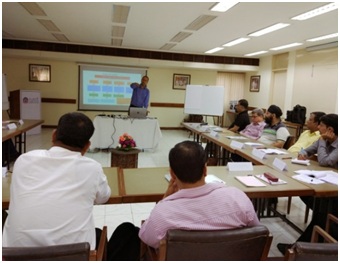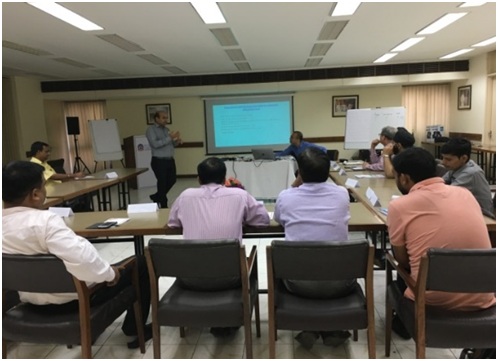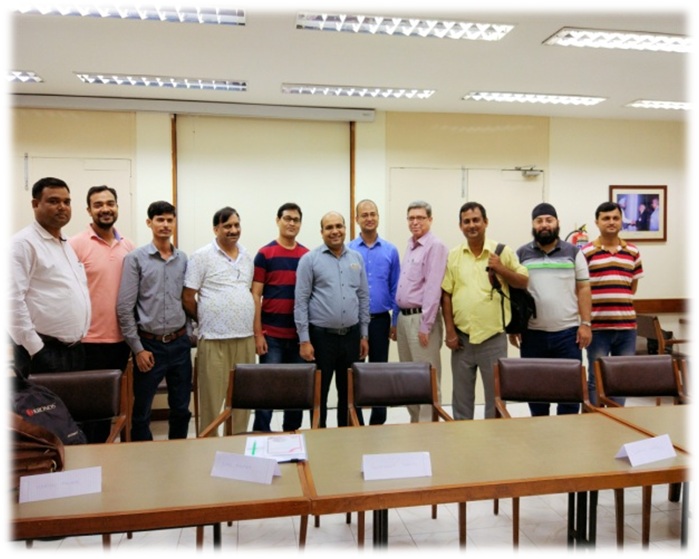 As you all know, the Goods and Service Tax (GST) came into effectin India from 1st July, 2017. We are proud to share a snapshot of the full-day workshop on ‘GST for Non-Profit Organizations (NPOs) & CSR Partners’ organized on 9thSeptember 2017 at Qutub Institutional Area, New Delhi.
As you all know, the Goods and Service Tax (GST) came into effectin India from 1st July, 2017. We are proud to share a snapshot of the full-day workshop on ‘GST for Non-Profit Organizations (NPOs) & CSR Partners’ organized on 9thSeptember 2017 at Qutub Institutional Area, New Delhi.
The objective of the workshop was to offer keen insights into the GST Act, and create an awareness about the underlying concepts. We aimed at addressing specific queries of the participants; clearly outlining the ambiguities where interpretation was subjective.
Two-and-a-half months after the GST rollout, it seems people are still struggling to get on with the ‘One Nation, One Tax’ system. The session witnessed extensive questioning whereinthe participants sought answersto their unique situationsand the possible implications for non-compliance. It was a healthy discussion where we addressedcertain significant technical issues.
As perthe Notification No.12/2017 – Central Tax (Rate), exemption are given to certain services, only if the following terms are satisfied:
- Services by an entity registered under section 12AA of the Income-Tax Act, 1961 (43 of 1961) by way of charitable activities
- Renting of precincts of a religious place meant for general public, owned or managed by an entity registered as a charitable or religious trust under section 12AA of the Income-Tax Act, 1961 (hereinafter referred to as the Income-Tax Act) or a trust or an institution registered under sub clause (v) of clause (23C) of section 10 of the Income-Tax Act or a body or an authority covered under clause (23BBA) of section 10 of the said Income-Tax Act. However, one will not be excluded from the ambit of GST if:
- the rent of the room is Rs.1,000/- or more per day;
- the rent of premises, community halls, kalyanmandapam or open area, and the like isRs. 10,000/- or more per day;
- the rent of the shops or other spaces for business or commerce is Rs. 10,000/- or more per month.
- Services by way of training or coaching in recreational activities relating to
- arts or culture, or
- sports by charitable entities registered under section 12AA of the Income-Tax Act
The notification further went on to define ‘charitable activities’ as:
(1) Public health by way of-
a. care or counselling of
i. terminally ill persons or persons with severe physical or mental disability;
ii. persons afflicted with HIV or AIDS;
iii. persons addicted to a dependence-forming substance such as narcotics drugs or alcohol; or
b.public awareness of preventive health, family planning or prevention of HIV infection;
(2) Advancement of religion, spirituality or yoga;
(3) Advancement of educational programmes or skill development relating to,-
a. abandoned, orphaned or homeless children;
b. physically or mentally abused and traumatized persons;
c. prisoners; or
d. persons over the age of 65 years residing in a rural area;
(4) preservation of environment including watershed, forests and wildlife
The main technical issue brought to light during the discussion was the lack of clarity on the categorisation of services. The participants pointed that while they were registered under section 12AA, most of their activities did not fallunder the limited definition of ‘charitable activities’.
Also, the applicability of reverse charge as per Notification No. 13/2017- Central Tax (Rate) where services provided by a Goods Transport Agency (GTA), an advocate or an online purchase.
Sushil Kumar, a practicing CA and a GST expert who conducted the second half of the workshop shared his opinion on the above questions. He advised the participants not to register under GST if their activities were restricted to the objects mentioned in their charter and covered under section 12AA.
The payment to an advocate isnot covered for societies under reverse charge. GTA does not include a truck owner who carries on the business of transportation of goods. “GTA is specifically defined in the Act, and it necessarily issues a consignment note to the client,” Kumar added.
Basis for the advice:
- Section 9(4) of the CGST Act is under review since it excludes the role of the GST Council. This was not included in the draft law and was later introduced by the government.
- The definition of ‘charitable activities’ is not part of the CGST Act but was later included through a notification. Hence, it is open to questioning and debate under law.
Overall, the workshop was an interesting session, and we look forward to other such sessions (as part of the GST Dialogue Series) where we would focus on issues specific to industries/sectors, and thus help alleviate some of the problems faced by the audience.


